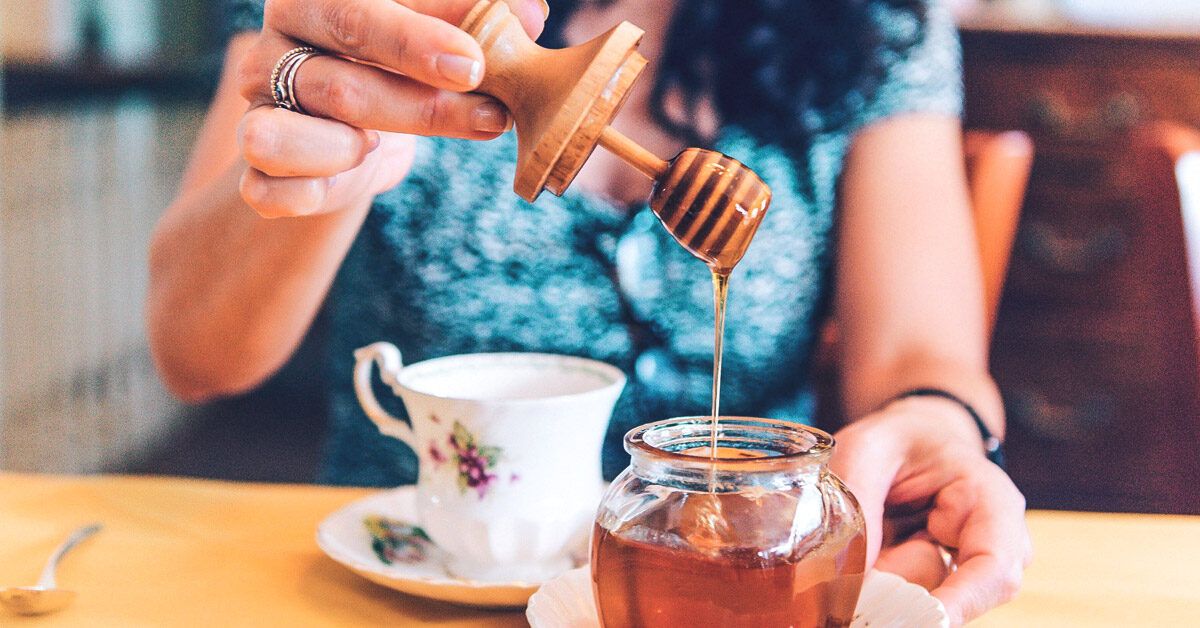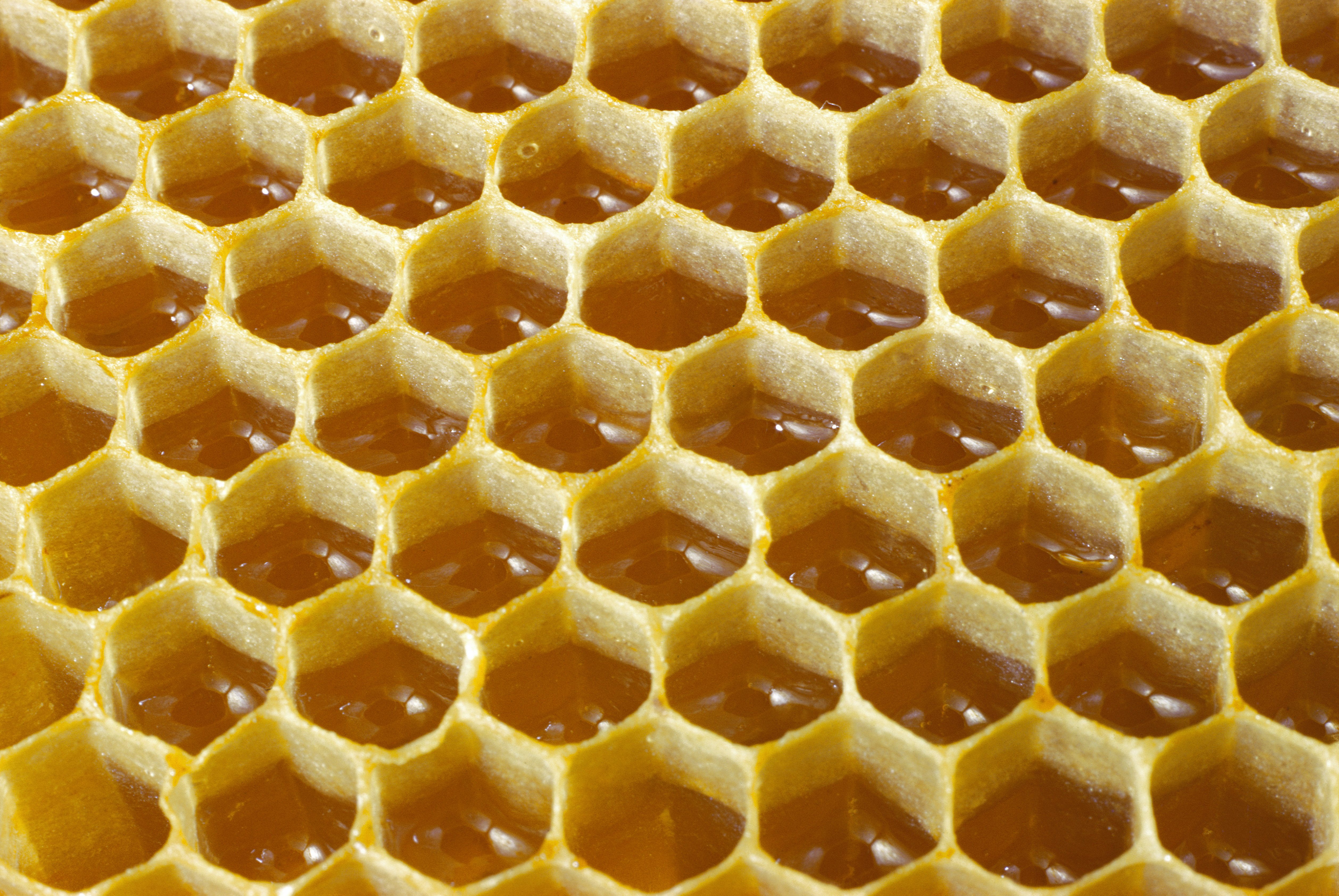I've been drinking a lot of fruit juice lately-- not even the good shit which still has too much sugar, but more like Hawaiian Punch type fruit juice.
So I started drinking a lot of tea this week, trying to have something more flavorful than water but still healthy. I used to put a good amount of raw sugar in my tea but I'm trying raw unfiltered honey now.
Honey has a lower GI value than sugar, meaning that it does not raise blood sugar levels as quickly. Honey is sweeter than sugar, so you may need less of it, but it does have slightly more calories per teaspoon so it's wise to keep a close eye on your portion sizes. For diabetics, or those trying to manage their blood sugar levels, there is no real advantage to substituting sugar for honey as both will ultimately affect blood sugar levels. It's also worth remembering that like other syrups, honey is classed as 'free' sugars – the type we are advised to cut back on. If you do prefer honey, try to choose a raw variety, which contains more vitamins, enzymes, antioxidants and nutrients than white sugar and use it in moderation. It is worth remembering, however, that any nutritional benefit from consuming honey is negligible.

 www.bbcgoodfood.com
.
www.bbcgoodfood.com
.
The Scientist: Keith Kantor, Ph.D., a nutritionist and author of the children's book The Green Box League of Nutritious Justice
The Answer: Sugar is sugar. And honey is (mostly) sugar. But if you're choosing between the two from a health perspective, err on the side of the sticky stuff.

Pros

 www.healthline.com
www.healthline.com
Is honey healthy?
Research has linked honey to an improvement in gut microbial balance, coughing and other respiratory conditions. Because of honey’s trace nutrients, the sweetener has been thought to have antibacterial, antioxidant and anti-inflammatory properties, along with healing potential for ailments such as sore throats, digestive disorders and burns, Friedman says.
But it’s important to consider the full nutritional picture. To get many of these benefits, “we’d have to eat a lot of honey,” says Friedman. “And unfortunately, consuming a lot of honey means consuming a lot of calories.”
Remember: Honey is sugar — something that Americans consume in excess. The American Heart Association recommends limiting added sugar to about six teaspoons per day for women and about nine teaspoon per day for men, but the average American adult consumes about two to three times more than this.
“Consuming sugar in excess amounts has been implicated in causing increased weight gain as well as increased risk of chronic diseases like heart disease and diabetes,” says Meredith Price, a registered dietitian at Priceless Nutrition & Wellness in New York.
Is honey an added sugar?
The U.S. Food and Drug Administration (FDA) recently required that food labels start differentiating between types of sugar: specifically by calling out added sugars, or sugars that are added to foods when they’re processed or prepared.
And even though honey comes from a natural source, it is still an added sugar, like corn syrup or cane sugar. “A lot of people feel better when they read a food label and see honey instead of sugar,” says Friedman. “However, in the long run, the nuance is more meaningful to the mind than the body. The body pretty much perceives sugar and honey added to foods the same way.”
Certain terms on products — like “natural sugars,” “no artificial sugars” or “naturally sweetened” — are often simply marketing tactics, says Price.
What’s the healthiest way to eat honey?
It’s important to consume honey in moderation, experts say. A little goes a long way. Think of a serving size of honey as about a tablespoon (the size of your thumb or a poker chip), says Friedman. This much honey has about 64 calories and 17 grams of sugar, according to the USDA’s food composition database. Aim to keep your daily intake from any added sugar under 100 calories a day for women and 150 calories a day for men, suggests Hunnes.
Because honey’s flavor is largely what distinguishes it from other sweeteners, Friedman recommends using it in ways that highlight flavor. Drizzle up to a tablespoon into tea, on top of yogurt, into morning oats or on peanut butter toast. Honey also works well in dressings, she says.
The main types of honey are organic, dark, light, raw and filtered, says Friedman, but there are over 300 varieties of honey. “The variety refers to where the honey comes from, basically the types of flowers bees have fed on,” she says. “The color, flavor and major nutritional properties of honey all depend on the nectar that the bees used.”
So what’s the best type to buy? “It depends on what flavors you’re looking for and how you’re using it. Manuka honey has a stronger and distinct taste that might not make it great for using in baking, for example,” she says. Darker honey is also said to be higher in antioxidants, she notes, but it tends to have a more intense, bitter flavor that not everyone enjoys. “Buckwheat is one variety that has been highlighted for a robust nutrient profile.”
When it comes to buying honey, it’s important to do your research. Honey — especially when it’s imported — can be cut with other sweeteners like corn syrup. “Always read the label to determine what you’re getting,” Friedman says.
It’s also easier to detect a genuine product if you can actually get your hands on the honey itself, she says. “True honey is thick and slow moving (though the texture of honey may differ depending on whether it is raw or unfiltered). It shouldn’t spread out like syrup and actually won’t feel too sticky on your hands. The smell is distinct, usually floral.”
When possible, try to buy locally produced honey from a place where you can see the honeybees or how the honey is produced, Hunnes says. Doing this makes it more likely that the honey you’re buying is actually honey.

 time.com
time.com
So I started drinking a lot of tea this week, trying to have something more flavorful than water but still healthy. I used to put a good amount of raw sugar in my tea but I'm trying raw unfiltered honey now.
Honey vs. Sugar
Honey has a lower GI value than sugar, meaning that it does not raise blood sugar levels as quickly. Honey is sweeter than sugar, so you may need less of it, but it does have slightly more calories per teaspoon so it's wise to keep a close eye on your portion sizes. For diabetics, or those trying to manage their blood sugar levels, there is no real advantage to substituting sugar for honey as both will ultimately affect blood sugar levels. It's also worth remembering that like other syrups, honey is classed as 'free' sugars – the type we are advised to cut back on. If you do prefer honey, try to choose a raw variety, which contains more vitamins, enzymes, antioxidants and nutrients than white sugar and use it in moderation. It is worth remembering, however, that any nutritional benefit from consuming honey is negligible.

Sugar substitutes - honey explained
Sweeter than sugar and with twice the nutritional profile could honey be the ultimate alternative to table sugar? We explore the nutritional highs and lows of this popular porridge topper...
The Scientist: Keith Kantor, Ph.D., a nutritionist and author of the children's book The Green Box League of Nutritious Justice
The Answer: Sugar is sugar. And honey is (mostly) sugar. But if you're choosing between the two from a health perspective, err on the side of the sticky stuff.

Pros
- You can use a smaller amount of honey without sacrificing sweetness.
- It contains traces of vitamins and minerals.
- Raw honey may help alleviate your allergies.
- Honey is high in calories.
- It’s primarily made up of sugar.
- It may not be safe for infants younger than a year.

Which Is Better, Honey or Sugar?
When it comes to honey vs. sugar, which is the healthier choice? Here’s what you need to know.
Is honey healthy?
Research has linked honey to an improvement in gut microbial balance, coughing and other respiratory conditions. Because of honey’s trace nutrients, the sweetener has been thought to have antibacterial, antioxidant and anti-inflammatory properties, along with healing potential for ailments such as sore throats, digestive disorders and burns, Friedman says.
But it’s important to consider the full nutritional picture. To get many of these benefits, “we’d have to eat a lot of honey,” says Friedman. “And unfortunately, consuming a lot of honey means consuming a lot of calories.”
Remember: Honey is sugar — something that Americans consume in excess. The American Heart Association recommends limiting added sugar to about six teaspoons per day for women and about nine teaspoon per day for men, but the average American adult consumes about two to three times more than this.
“Consuming sugar in excess amounts has been implicated in causing increased weight gain as well as increased risk of chronic diseases like heart disease and diabetes,” says Meredith Price, a registered dietitian at Priceless Nutrition & Wellness in New York.
Is honey an added sugar?
The U.S. Food and Drug Administration (FDA) recently required that food labels start differentiating between types of sugar: specifically by calling out added sugars, or sugars that are added to foods when they’re processed or prepared.
And even though honey comes from a natural source, it is still an added sugar, like corn syrup or cane sugar. “A lot of people feel better when they read a food label and see honey instead of sugar,” says Friedman. “However, in the long run, the nuance is more meaningful to the mind than the body. The body pretty much perceives sugar and honey added to foods the same way.”
Certain terms on products — like “natural sugars,” “no artificial sugars” or “naturally sweetened” — are often simply marketing tactics, says Price.
What’s the healthiest way to eat honey?
It’s important to consume honey in moderation, experts say. A little goes a long way. Think of a serving size of honey as about a tablespoon (the size of your thumb or a poker chip), says Friedman. This much honey has about 64 calories and 17 grams of sugar, according to the USDA’s food composition database. Aim to keep your daily intake from any added sugar under 100 calories a day for women and 150 calories a day for men, suggests Hunnes.
Because honey’s flavor is largely what distinguishes it from other sweeteners, Friedman recommends using it in ways that highlight flavor. Drizzle up to a tablespoon into tea, on top of yogurt, into morning oats or on peanut butter toast. Honey also works well in dressings, she says.
The main types of honey are organic, dark, light, raw and filtered, says Friedman, but there are over 300 varieties of honey. “The variety refers to where the honey comes from, basically the types of flowers bees have fed on,” she says. “The color, flavor and major nutritional properties of honey all depend on the nectar that the bees used.”
So what’s the best type to buy? “It depends on what flavors you’re looking for and how you’re using it. Manuka honey has a stronger and distinct taste that might not make it great for using in baking, for example,” she says. Darker honey is also said to be higher in antioxidants, she notes, but it tends to have a more intense, bitter flavor that not everyone enjoys. “Buckwheat is one variety that has been highlighted for a robust nutrient profile.”
When it comes to buying honey, it’s important to do your research. Honey — especially when it’s imported — can be cut with other sweeteners like corn syrup. “Always read the label to determine what you’re getting,” Friedman says.
It’s also easier to detect a genuine product if you can actually get your hands on the honey itself, she says. “True honey is thick and slow moving (though the texture of honey may differ depending on whether it is raw or unfiltered). It shouldn’t spread out like syrup and actually won’t feel too sticky on your hands. The smell is distinct, usually floral.”
When possible, try to buy locally produced honey from a place where you can see the honeybees or how the honey is produced, Hunnes says. Doing this makes it more likely that the honey you’re buying is actually honey.

Is Honey Healthy? Here's What Experts Say
It's good for a cough—but there's more to the story

